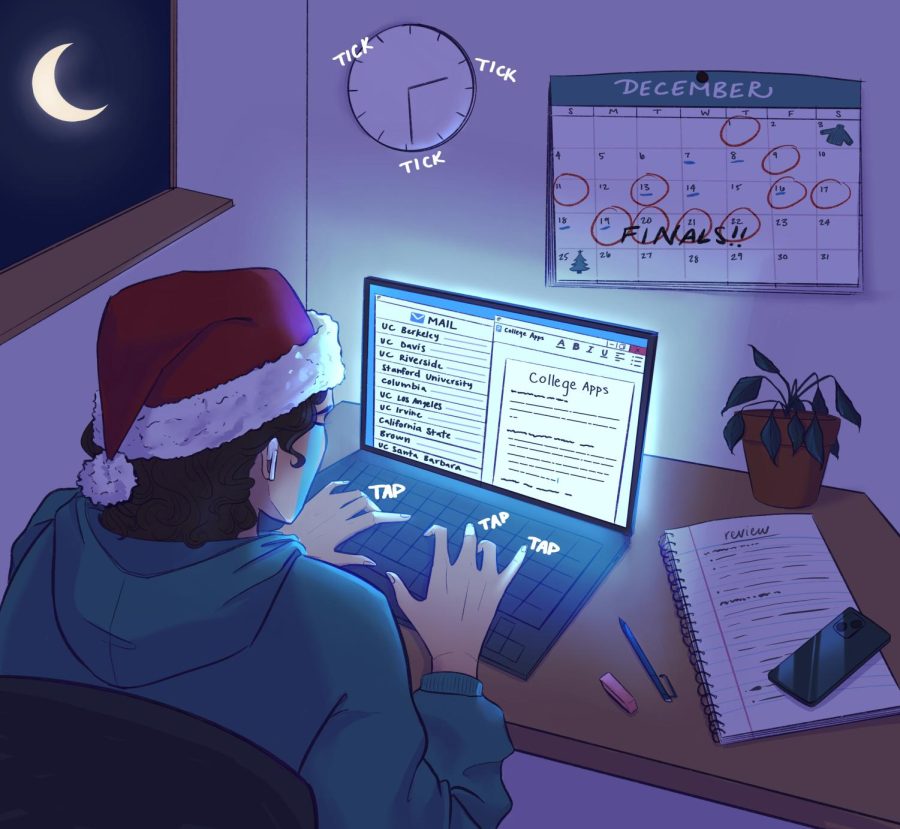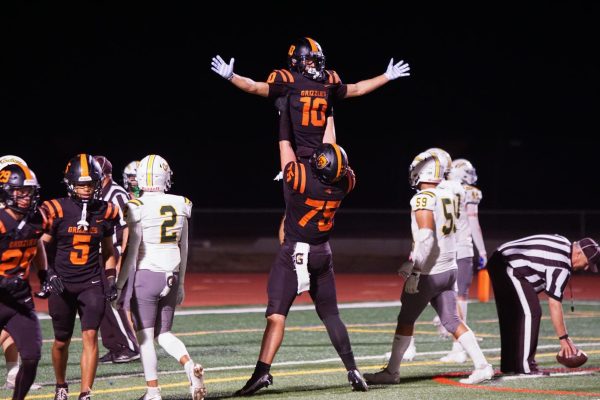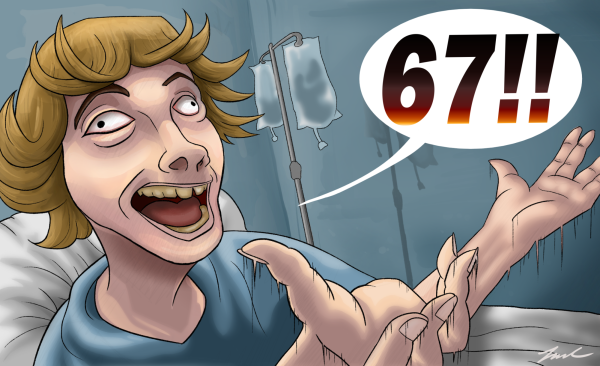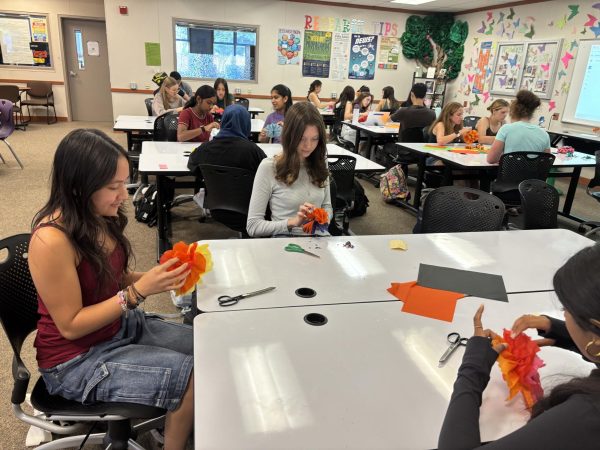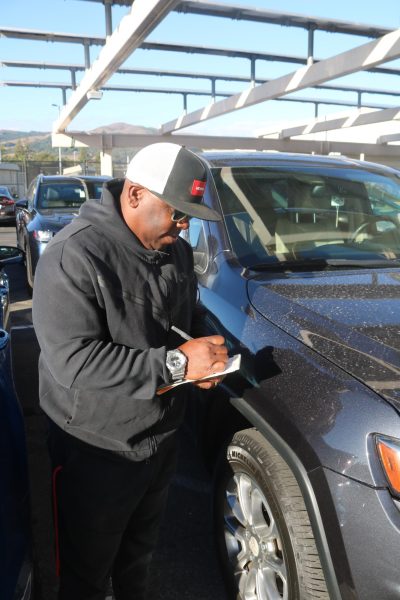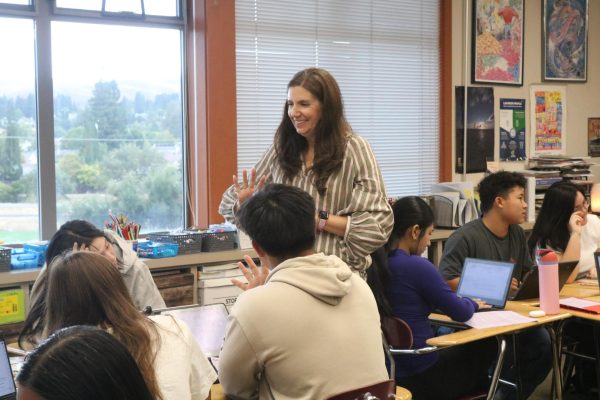Seniors look back on college apps
Early applications cause different reactions from students
A festive senior feverishly types an early action college essay in the dead of night as application deadlines approach.
As college and university early application deadlines pass, seniors who applied early action and decision now have time to reflect on their experiences during one of the pivotal moments of their lives.
The college application process is a procedure that all high school students have to undergo if they plan on earning a degree or studying academics beyond high school. Students who choose to go through this process have to write several essays and complete numerous applications.
Once applications are submitted, colleges will usually respond in two to four months, notifying students if they have been accepted, waitlisted, deferred, or denied.
“[College applications] is the process of deciding what schools you’re best fit for,” senior Ryan Ge said. “Students can apply for schools based on their GPA, interests, passions, and affordability.”
When it comes to college applications, some students choose to apply early to the schools they hope to attend while others wait until later in the year. The process of applying early to colleges is referred to as early action/early decision.
Students who choose to apply early action don’t have to commit to the school they’re applying to. In contrast, early decision applications are binding if students are accepted.
Applications for both types of early applications are usually due in November or December, while regular decision applications are typically due in January and February.
“I started drafting [for early action] in late August,” senior Sua Kim said. “And then I started editing around mid-October for early action and early decision, since applications were due Nov. 1, so the whole process took around two months for me.”
Most students who choose to apply early do so because there is usually a higher acceptance rate than regular decisions, giving them an advantage in the application process. Additionally, students who apply early say they feel less stressed during the winter.
“I wanted to assure myself that I was getting into where I needed to go, and I didn’t want to have to stress about it too late into the year,” senior Ava Olguin said.
Regular decision applications also have their benefits.
“Early action is really stressful because you have schoolwork on top of everything else,” senior Ashley Pham said. “I take three APs, so if I decided to do early applications, I would have to balance schoolwork with all of the college stuff, which is why I just decided to do regular applications.”
College applications are infamous for being tedious, grueling and stressful. Many Cal students agree with Kim.
“It was a lot harder than it looks because people would always tell me about it being bad when they were applying,” Kim said. “But it wasn’t until I actually started doing it myself that I realized how bad it was.”
But not all seniors agree.
“I thought it was great,” Olguin said. “It was kept short and the questions weren’t too long. I didn’t think it was something that took up too much of my time, and I actually learned a lot about myself while writing the personal insight questions.”
Senior Kian Kasad warned that obtaining recommendation letters may be a struggle for some students.
“You have to ask the teacher several months in advance, and then input it into Naviance,” Kasad said. “Then you have to check with your counselor to make sure that they got the letter. You also have to make sure that your counselor has sent the letter to the colleges on your list.”
Another issue that arises is the cost of applications, which can affect families with low income.
“The ideal number of colleges that you’ll want to apply to is 10 to 15,” Kim said. “And each application costs around anywhere from $50 to $100, which is a lot for students doing ten or more applications.”
Many seniors and teachers have advice for underclassmen about the application process.
“Definitely start early because writing all of your essays in one night is not fun,” Kim said. “I ended up submitting one of my applications 42 seconds before it was due and [it] was really stressful. So just try to get a head start and make a solid list of colleges to apply to.”
Meanwhile, Kasad stresses the importance of college essays.
“The prompts for essays come out way before the applications open,” Kasad said. “So in order to reduce the amount of work you have to do, start on the essays early and that way, it’s a little less pressure.”
Cal Honors Principles of Biomedical Science teacher Joanna Condon thinks students should document their achievements over the years.
“It’s important for [high school youth] to be experiencing things and logging their experiences down,” Condon said. “That way, by the time they hit senior year, they’ve gathered a bunch of experiences and have a nice balance between academics and other aspects.”
Counselors can also assist in the application process.
“The counselors have been really helpful for me,” Pham said. “So don’t be afraid to go to them. They can answer all of your questions and they’re really supportive.”
Many students have a common misconception that the more colleges they apply to the better. Cal’s college and career advisor Kathryn Nichols advises against this.
“Typically, you don’t want to apply to more than 12 to 15 schools,” Nichols said. “The reason for this is that more applications means more essays and more work to do, and it’s not smart to create more work for yourself.”
Nichols said it’s also helpful to visit the schools students want to apply to in person, if possible.
“Decide geographically where you want to go with [academics beyond high school] first,” Nichols said. “And see if you match the general GPA and other profiles of students that were admitted to that school.”
Cal counselor Cheryl Youngberg feels that it’s essential for students to keep an open mind while applying to colleges.
“When I applied to college, I had this idea of where I wanted to go and what I thought was a good school,” Youngberg said. “However, I ended up going to a college that wasn’t even on my considered list at the time. I made the choice to open my mind and not close anything off, and it really helped me.”
Cal teachers understand that working on college applications is a stressful ordeal, so many have found ways to assist students in the process.
Cal Economics and AP Psychology teacher Sarah Eddings assigns a project in her economics class each year that encourages students to think more about their budget in terms of which colleges to apply to.
“I think a lot of students right now aren’t spending as much time on the issue of college loan debt,” Eddings said. “So in those projects, we look at how much different colleges cost and how much students would have to take out in debt. Often students will change the list of colleges they’re applying to based on that.”
Even though college applications may seem daunting right now, Eddings reassures students to try not to be overly stressed or overwhelmed about the process or about their GPA.
“I think it’s really important to keep it in perspective,” Eddings said. “College admissions are very, very competitive, and the results don’t always make sense. So I just wanted all students to know, no matter where you go to college, you’re going to be okay.”
Cal juniors Swathi Devulkar and Reynold Wong have expressed apprehension toward the looming prospect of having to undergo the college application process next school year.But they’ve maintained a positive attitude toward it.
“I’ve heard they’re super nerve-wracking, but I’m hoping to gain experience from applying to colleges,” Devulkar said. “And even if I get rejected from certain schools, I can still learn life lessons that’ll help prepare me for the future.”
Wong agrees.
“To be honest, I think [college applications] will probably be pretty stressful for me,” Wong said. “But college is the next big step in my life after high school, so I think I can get through it.”

Senior Sophia Liu is at The Californian for a third year as an assistant news editor. She’s hoping to make valuable memories at Cal this year working...
